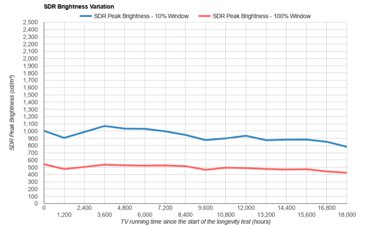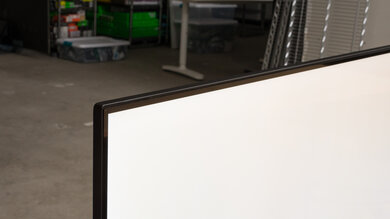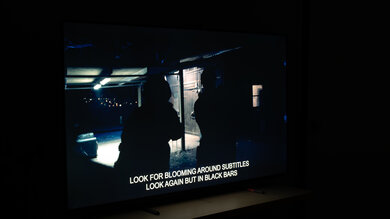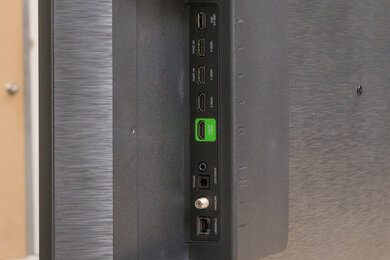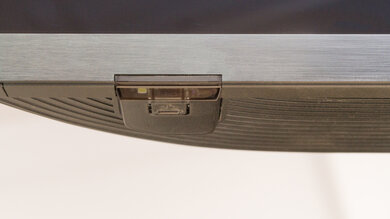The Vizio P Series Quantum 2021 is a great TV that replaces the Vizio P Series Quantum 2020. It improves in a few areas compared to its predecessor, but there are some disappointments for a high-end 4k TV. It's still plagued with bugs and issues, like having issues with proper chroma 4:4:4 with 120Hz signals. It supports FreeSync variable refresh rate (VRR) technology to reduce screen tearing and has HDMI 2.1 bandwidth. In terms of picture quality, it has a VA panel with a fantastic native contrast ratio, so it displays deep blacks, and the decent full-array local dimming feature improves it. Even in well-lit rooms, it has amazing reflection handling and high peak brightness. Fans of 4k HDR movies should also enjoy it, but it's not so good for watching old movies on DVDs as it has trouble upscaling some lower-resolution content.
Our Verdict
The Vizio P Series is great for most uses. It performs really well for watching movies in dark rooms thanks to its high contrast and decent local dimming feature. Even in well-lit rooms, it gets bright enough to combat glare and has amazing reflection handling. It's impressive for watching HDR content as it displays a wide color gamut and gets bright. It has a few gaming features like variable refresh rate support, but its response time is only decent, and it has issues displaying clear text with some signals.
- Displays deep blacks due to high contrast.
- Removes 24p judder from native apps and Blu-rays.
- Decent full-array local dimming helps improve the contrast.
- High peak brightness in SDR and HDR.
- 120Hz panel and VRR support.
- Has trouble upscaling 480p and 720p content properly.
- Only decent response time; black smearing is visible.
The Vizio PQ9 is great for watching TV shows in a bright room. It gets bright enough to combat glare and has amazing reflection handling, so visibility shouldn't be an issue. You can cast anything you want from your phone if you want to stream your favorite shows. However, it's not as good as other 4k TVs at upscaling 720p content, and it has narrow viewing angles, so the image looks washed out at the sides.
- Removes 24p judder from native apps and Blu-rays.
- High peak brightness in SDR and HDR.
- Amazing reflection handling.
- Can cast anything you want from your phone.
- Has trouble upscaling 480p and 720p content properly.
- Narrow viewing angles.
The Vizio P Series TV is good for watching sports in well-lit environments. Its reflection handling is amazing, and it has excellent peak brightness, so glare shouldn't be an issue in most bright rooms. Sadly, you may notice motion blur with fast-moving players or balls because the response time is only decent. It also has narrow viewing angles, so it's not an ideal choice for watching the game in a large viewing area.
- Removes 24p judder from native apps and Blu-rays.
- High peak brightness in SDR and HDR.
- Amazing reflection handling.
- Can cast anything you want from your phone.
- Has trouble upscaling 480p and 720p content properly.
- Narrow viewing angles.
- Only decent response time; black smearing is visible.
The Vizio P65Q9 is excellent for gaming. It has a 120Hz panel with FreeSync support to reduce screen tearing. It also has HDMI 2.1 bandwidth, but you need to update it to the latest firmware for it to work properly. Input lag is really low, and even though it has a decent response time, there's still visible motion blur with fast-moving content.
- Displays deep blacks due to high contrast.
- Removes 24p judder from native apps and Blu-rays.
- Decent full-array local dimming helps improve the contrast.
- 120Hz panel and VRR support.
- Low input lag.
- Only decent response time; black smearing is visible.
The Vizio PQ9 is impressive for HDR content. Its VA panel displays deep and uniform blacks and the local dimming feature does a decent job at improving the picture quality in dark scenes. It displays a really wide color gamut for HDR content and gets bright enough to make highlights pop the way the creator intended.
- Displays deep blacks due to high contrast.
- Removes 24p judder from native apps and Blu-rays.
- Decent full-array local dimming helps improve the contrast.
- High peak brightness in SDR and HDR.
- Displays really wide color gamut.
- Some blooming around bright objects in dark scenes.
The Vizio P Series Quantum TV is excellent for HDR gaming. It has excellent gaming performance thanks to its 120Hz panel, FreeSync support, and low input lag. It has full HDMI 2.1 bandwidth, but only after updating it to the latest firmware. In terms of HDR, it has a high native contrast, decent local dimming, a wide color gamut, and high peak brightness, so highlights pop and colors are vivid.
- Displays deep blacks due to high contrast.
- Removes 24p judder from native apps and Blu-rays.
- High peak brightness in SDR and HDR.
- 120Hz panel and VRR support.
- Low input lag.
- Displays really wide color gamut.
- Some blooming around bright objects in dark scenes.
- Only decent response time; black smearing is visible.
The Vizio P Series is great to use as a PC monitor. It has low input lag for a responsive desktop experience, but its response time is just decent. It has amazing reflection handling and excellent peak brightness if you want to use it in a bright room, but it has narrow viewing angles, so the edges look washed out if you sit too close. Also, it only displays chroma 4:4:4 with 1080p and 4k signals at 60Hz, as it can't do it with 120Hz signals.
- Removes 24p judder from native apps and Blu-rays.
- High peak brightness in SDR and HDR.
- Amazing reflection handling.
- 120Hz panel and VRR support.
- Low input lag.
- Narrow viewing angles.
- Only decent response time; black smearing is visible.
- Can't display chroma 4:4:4 with any 120Hz signal; limited to 60Hz.
Changelog
- Updated Sep 26, 2025: We uploaded the latest brightness measurements and uniformity photos for the Accelerated Longevity Test.
- Updated Jul 08, 2025: We uploaded the latest brightness measurements and uniformity photos for the Accelerated Longevity Test.
- Updated Apr 17, 2025: We uploaded the latest brightness measurements and uniformity photos for the Accelerated Longevity Test.
- Updated Feb 11, 2025: We uploaded the latest brightness measurements and uniformity photos for the Accelerated Longevity Test.
Check Price
Differences Between Sizes And Variants
We tested the 65 inch Vizio P Series (P65Q9). It's also available in a 75 inch size (P75Q9-J01), but we've received confirmation that that size uses an IPS-style panel, so we expect it to perform differently from the model we bought. There's also an 85 inch P Series Quantum X 2021 model available, but our review isn't valid for that because it's advertised to get brighter and have more dimming zones.
| Size | Model | Dimming Zones |
|---|---|---|
| 65" | P65Q9-J01 | 144 |
| 75" | P75Q9-J01 | 210 |
If someone comes across a different type of panel or their P Series Quantum doesn't correspond to our review, let us know and we'll update the review. Note that some tests, like gray uniformity, may vary between individual units.
You can see the label of our unit here.
Popular TV Comparisons
The Vizio P Series is a great TV with excellent overall picture quality in both dark and bright rooms. It's a slight improvement from the Vizio P Series Quantum 2020, but it has many of the same issues. There are too many bugs when it comes to some 120Hz signals, and considering its price point, there are other gaming TVs that won't give you as many headaches.
Also see our recommendations for the best gaming TVs, the best TVs for HDR, and the best 4k TVs.
The Vizio P Series Quantum 2021 is better than the Vizio M Series Quantum X 2022. They have similar peak brightness, but the P Series has much better reflection handling, so it's a better choice for a bright room, as glare is less distracting. The P Series also has much better contrast, making it a better choice for a dark room, as blacks are deeper and more uniform.
The Vizio P Series Quantum X 2020 and the Vizio P Series Quantum 2021 are both great 4k TVs. They have similar features and each use VA panels with a high contrast ratio, at least on the 65 inch sizes, but local dimming is better on the Quantum X because it displays deeper blacks and has better uniformity. The Quantum X also gets brighter in HDR, so highlights pop more. Motion looks smoother on the Quantum X due to the quicker response time. The Quantum comes with the new Vizio remote, which has voice control, and the Quantum X doesn't have that.
The Hisense U8G and the Vizio P Series Quantum 2021 are both great TVs, but the Hisense is more well-rounded. They each have a high contrast ratio on the 65 inch sizes, but the Hisense has better local dimming to display more uniform blacks. The Hisense has a much quicker response time, so motion looks better, and its gaming features don't have as many bugs as the Vizio as you can easily play 4k games up to 120fps. The Android TV interface is also better than Vizio's SmartCast system as it doesn't crash as much.
The Vizio P Series Quantum 2021 replaces the Vizio P Series Quantum 2020, and they're both great TVs. The 2021 improves in a few areas, like higher HDR peak brightness and better contrast and black uniformity, but this can vary between units. The 2021 model has trouble properly displaying 480p content, which we didn't see with the 2020 model. Motion looks a lot better on the 2020 model because it has a much quicker response time. They each have HDMI 2.1 inputs, and even though they both have trouble displaying 4k content at 120fps, the 2021 model doesn't have problems with the PS5 and Xbox Series X the way that the 2020 model did.

We buy and test dozens of TVs yearly, taking an objective, data-driven approach to deliver results you can trust. Our testing process is complex, with hundreds of individual tests that take over a week to complete. Most of our tests are done with specially designed test patterns that mimic real content, but we also use the same sources you have at home to ensure our results match the real-world experience. We use two main tools for our testing: a Colorimetry Research CR-100 colorimeter and a CR-250 spectroradiometer.
Test Results
Older Test Bench: This product has been tested using an older TV test methodology, before a major update. Some of the test results below aren't directly comparable with other TVs. Learn more


The Vizio PQ9 looks similar to the Vizio M7 Series Quantum 2021, but the feet are more set inwards. It has a simple design with thin borders that aren't distracting in any way.
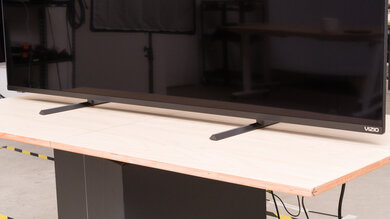
The Vizio P Series Quantum TV features unique feet that are designed to hold a soundbar on top. There's rubber padding on top of each foot to avoid scratching the feet or soundbar. You can raise the screen higher so that a soundbar doesn't block your view. In the regular position (pictured above), there's 1.38" from the feet to the screen, and raising them in the higher position gives you 3.5" of space, so most soundbars shouldn't block it.
Footprint of the 65" TV: 28" x 13.4".
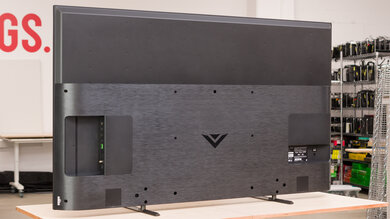
The back has a more stylish design than past Vizio TVs as it has rounded edges. The top part is slightly textured metal and the bottom part is plastic designed to look like brushed aluminum. There are clips for cable management that you attach to the feet, and you can also attach them to the legs when in the raised position.
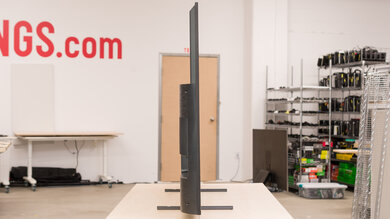
This TV is thicker than the Vizio P Series Quantum 2020, but it still shouldn't stick out too much when wall-mounted.

The Vizio P Series has great build quality. It feels well-built with metal around the frame that feels solid, but the plastic on the back flexes a bit more. The TV is stable on the stand, but it sways more forward and backward with the feet in the raised position.

The Vizio P Series has a VA panel with a high native contrast ratio to display deep blacks. The full-array local dimming feature does a great job at improving the contrast. It's better than the Vizio P Series Quantum 2020, but this can also vary between units.
Note: The 75 inch model has an IPS panel, so we expect it to have much worse contrast, resulting in blacks that look gray in a dark room.

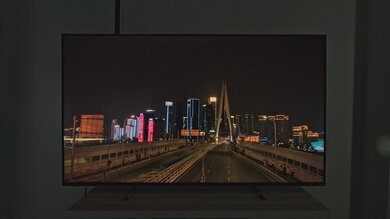

The Vizio PQ9 has impressive HDR peak brightness. Surprisingly, our test slides are about the same brightness as in SDR, but the real scene brightness is much higher, so it's bright enough to make highlights pop. The EOTF follows the target fairly well, but most scenes are slightly over-brightened. Also, there's a sharp roll-off once the TV hits its peak brightness, so extremely bright scenes lose details.
We measured it with the same settings as the SDR peak brightness, but in HDR. If you find the image too dark, set the Gamma to '1.8', Color Temperature to 'Cool', and Local Contrast to 'High'. The image appears noticeably brighter, as you can see in this EOTF, but it doesn't affect the peak brightness, and the roll-off is even worse.



Update 03/08/2022: This TV received a firmware update (5.41.29.10-1), and Vizio advertised that the picture quality would improve in Game Mode. We remeasured the HDR peak brightness, and there was no significant change from before, so this update doesn't affect the HDR peak brightness in Game Mode.
The HDR brightness is once again impressive in Game Mode. The image looks the same as outside of Game Mode because you don't need to change the Picture Mode but rather just enable the Game Low Latency setting.
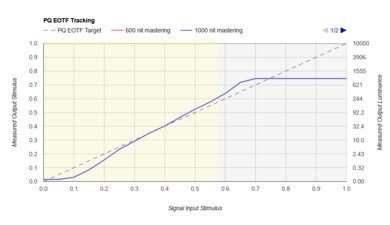
The SDR peak brightness is excellent. It gets bright enough to fight glare in most well-lit rooms, and even though brightness varies between scenes, it shouldn't be that distracting for most people.
We tested the SDR peak brightness after calibration in the 'Calibrated (Dark)' Picture Mode with Gamma set to '2.2', Color Temperature to 'Warm' and Active Full Array on 'High'.
If you want an even brighter image and don't care about accuracy, we reached an astonishing 1,127 nits in the 10% window using the same settings but in the 'Vivid' Picture Mode and Local Contrast on 'High'.
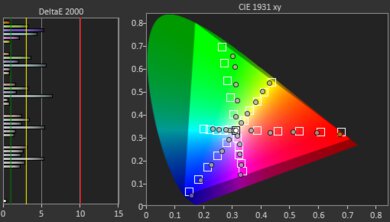
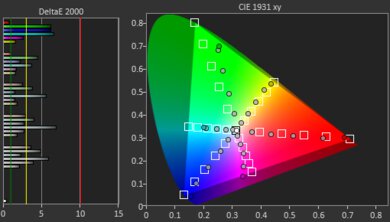
The Vizio P Series has an amazing color gamut for HDR content. It has exceptional coverage of the DCI P3 color gamut used by most content, and its coverage of the wider Rec. 2020 is also very good.
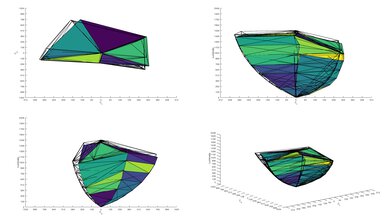
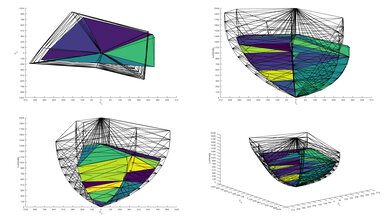
The color volume is good. It displays colors at a wide range of colors well, but it's not as good as the Vizio P Series Quantum 2020 because that TV displays a slightly wider color gamut. However, most people won't be able to tell the difference.
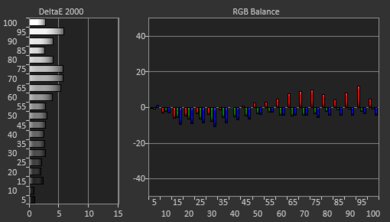
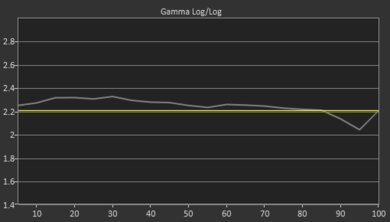
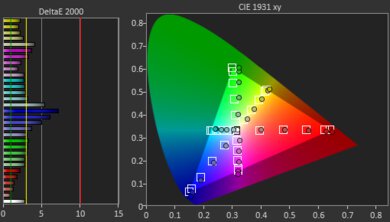
The Vizio P Series TV has good out-of-the-box accuracy. Color temperature is close to the 6500K target, and most colors are only slightly off, but blues are slightly over-saturated. White balance is also off, especially brighter whites. Gamma is okay, but most scenes are too dark and really bright scenes are over-brightened. Keep in mind that accuracy can vary between units.
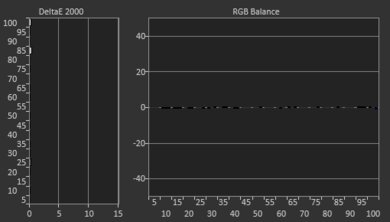
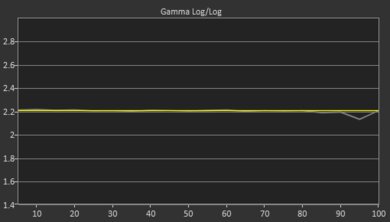
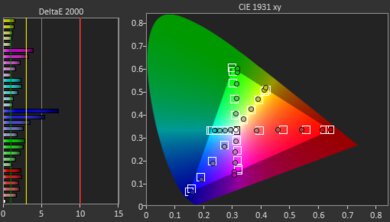
The accuracy after calibration is fantastic. The color temperature, gamma, and white balance are all improved and you shouldn't notice many inaccuracies with those. Colors improved too, but we couldn't fix the blues without making the rest of the image inaccurate.
You can see our recommended settings here.
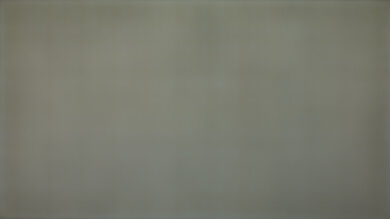

The gray uniformity is decent, but this can vary between units. There are blotchy parts throughout, including dirty screen effect in the center which could get distracting during sports. Uniformity is better in near-dark scenes, but there's also some backlight bleed at the left and right edges.


The black uniformity is excellent. It's good without the local dimming feature enabled, but the screen looks more blue, and there's still a bit of backlight bleed. The local dimming helps further deepen any blacks and remove any backlight bleed, but it also causes more blooming around the center cross. Keep in mind that uniformity can vary a bit between units.
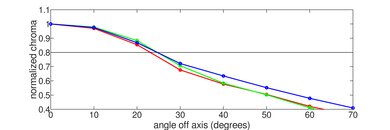
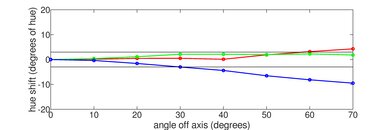
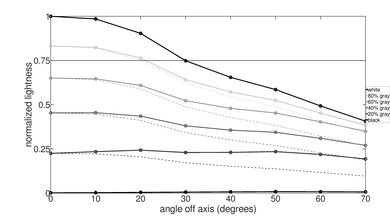
The Vizio P Series has disappointing viewing angles, which is expected from a VA panel. Colors quickly start to shift, and the image looks too dark when viewing from the sides. There's an 'Advanced Viewing Angle' setting, but it doesn't seem to improve the viewing angles on other Vizio TVs, so we didn't measure the viewing angles with it enabled on this one.
Note: The 75 inch model has an IPS panel, so we expect it to have much better viewing angles than the 65 inch model.


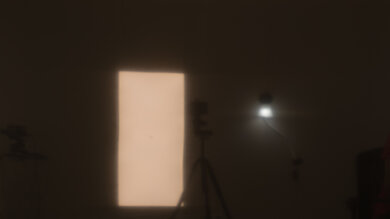
The reflection handling is amazing. It handles even most light sources really well, and visibility shouldn't be an issue. However, because it has a glossy screen, direct light sources like lightbulbs are reflected at a strong intensity, almost like a mirror.
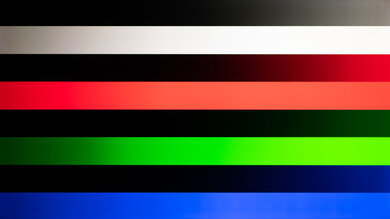
The Vizio PQ9 uses a BGR sub-pixel structure and may affect text clarity when using it as a PC monitor. You can read more about it here.
Note: The 75 inch model has an IPS panel, as confirmed by this pixel photo sent to us by an owner.

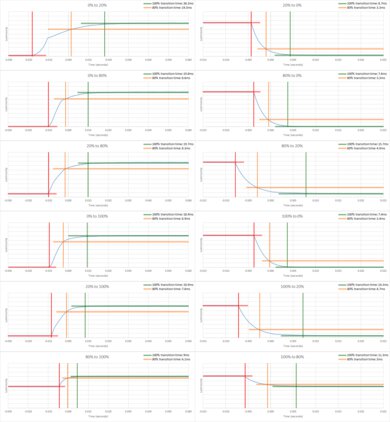
The Vizio P Series has a decent response time, but it's much worse than the Vizio P Series Quantum 2020 and the Vizio M Series Quantum X 2022. It's noticeably slow in dark transitions, leading to black smearing with darker objects. Overall, you'll notice motion blur with most content, and you may also notice image duplication due to the backlight flicker.
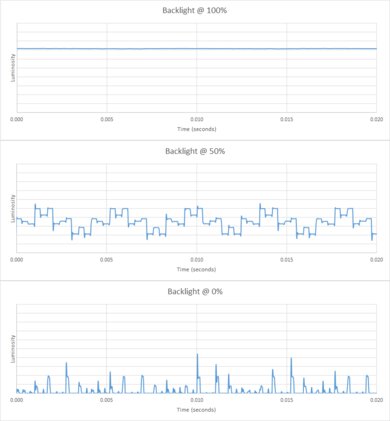
The Vizio P Series uses pulse width modulation (PWM) to dim its backlight if you set the Backlight setting to anything below its max. It flickers at 240Hz, including with Game Low Latency enabled, which could lead to some image duplication.

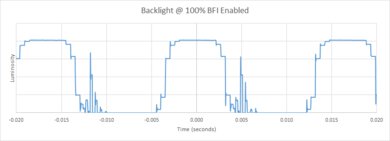
There's a backlight strobing feature, which is also known as black frame insertion, to try to clear up persistence blur. It only flickers at 60Hz and doesn't work that well because the timing of the strobing is off, creating image duplication. We saw a similar effect with the Vizio P Series Quantum 2020, but it's more noticeable on the 2021 model. Keep in mind that the BFI score is based on the flicker frequency, and not the actual performance.


The Vizio P Series has a motion interpolation feature, which causes the effect known as the soap opera effect. It interpolates 30fps and 60fps content up to 120fps, and it works well with slower scenes, but there are a ton of artifacts with fast-moving objects.
Due to the somewhat slower response time, there's not as much stutter on this TV.
Like other Vizio TVs, the Vizio P Series can only remove judder from native 24p sources, like Blu-ray players and native apps.
Update 03/08/2022: This TV received a firmware update (5.41.29.10-1) and it improved the VRR range. It's now tear-free with 4k signals over the entire refresh rate range with an AMD RX6600 XT graphics card, whereas before the update, VRR only worked up to 60Hz with 4k signals. However, even after the update, it's still not G-SYNC compatible, and 1440p still only works within a narrow range.
The Vizio P Series has a 120Hz panel with variable refresh rate support in the form of native FreeSync. G-SYNC doesn't work at all.
The Vizio P Series has low input lag for a responsive gaming experience. We didn't run into as many issues as we did with the Vizio P Series Quantum 2020, and we were able to get more consistent readings. Input lag remains low with most content, except it increases with 1080p @ 120Hz signals, which is the same behavior as the 2020 model. We measured the 4k @ 120Hz input lag by dropping the color depth to 8 bits and using a 4:2:0 signal.
Update 03/08/2022: This TV received a firmware update (5.41.29.10-1) and it allows the TV to display more resolutions. Unlike before, it displays 4k @ 120Hz signals with chroma 4:4:4 up to 12-bit color depth, but it's not proper chroma 4:4:4 because text looks blurry. Also, the screen glitches and goes black at times with 4k @ 120Hz signals, both in and out of Game Mode. It displays 1440p signals with a custom resolution without skipping frames or downscaling, but it doesn't display proper chroma 4:4:4 in 1440p because the text looks blurry.
The Vizio P Series supports 4k content up to 120Hz, but there are some quirks with it, especially with chroma 4:4:4. Although it accepts chroma 4:4:4 signals with any resolution at 120Hz, it doesn't properly display it as text looks blurry. If you want to use it as a PC monitor and display chroma 4:4:4 properly for clear text, you need to use a 1080p or 4k signal at 60Hz.

The Vizio P Series supports any signal up to 4k @ 120Hz from either the PS5 or Xbox Series X. It has an Auto Low Latency Mode, too, which switches the TV into Game Mode when you play a game from a compatible device.
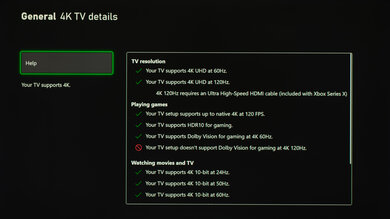
Update 03/08/2022: This TV received a firmware update (5.41.29.10-1) and it now supports full HDMI 2.1 bandwidth of 48 Gbps, as you can see here.
HDMI ports 3 and 4 support full HDMI 2.1 bandwidth as long as you update the TV to the latest firmware; otherwise you'll get HDMI 2.0 bandwidth.
Vizio dropped the Composite Inputs compared to the Vizio P Series Quantum 2020, which isn't ideal if you have old gaming consoles or a DVD player.
The Vizio P Series has eARC support through HDMI 1, and it can pass all common audio formats to a compatible receiver.
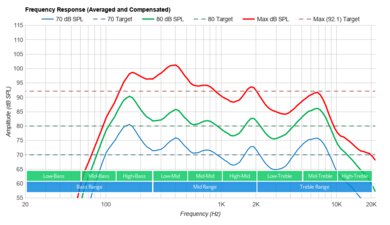
The Vizio P Series has an okay frequency response. It gets loud and has a fairly well-balanced sound profile, but you may hear some compression artifacts when listening at its max volume. Also, it doesn't produce much bass, so you should get a soundbar or a surround sound setup for the best audio experience possible.
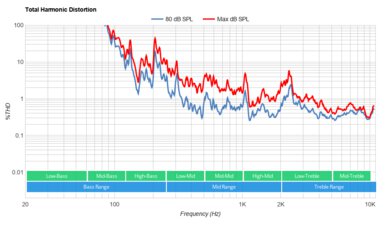
The distortion performance is okay. There isn't too much distortion at moderate listening levels, but it gets more noticeable at its max volume. Even at that, not everyone may hear it, and it depends on the content.
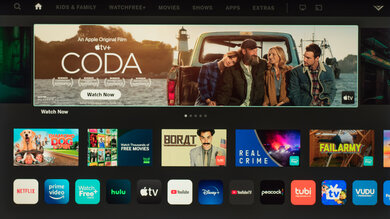
The Vizio PQ9 comes with the updated version of the Vizio SmartCast system, but there isn't much difference with previous versions. The interface is user-friendly, but it feels slow and laggy at times, and we experienced a few bugs during testing:
- As mentioned in the Supported Resolutions section, we originally couldn't display any 120Hz signal outside of Game Mode through our PC. We had to toggle Game Low Latency and restart the TV for it to even work at first. A few days later, we could get it outside of Game Mode, but the screen would constantly flicker black.
- We experienced issues where the remote would stop working properly at times. With our Blu-ray connected, the TV remote would freak out, and if we pressed the directional pad in any direction, it would continue to move in that direction even after we stopped pressing the remote. We had to take out the batteries and restart the TV for it to work again. This happened a few times during testing, even while using native apps and with the CEC disabled.
- The TV would randomly turn off, and this happened many times throughout testing with different HDMI inputs and various situations. We made sure our cables were connected properly, so we know it's not a physical connection issue.
There's suggested content on the home page and not ads, but we weren't able to get a photo of them during testing.
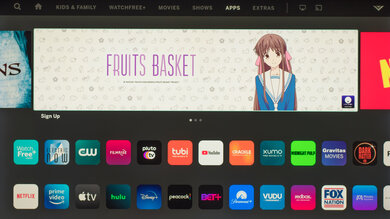
Vizio TVs don't come with an app store so you can only use the web-based apps it comes with. Luckily, there's a ton of apps available, including the most popular streaming services. It's advertised to support both Google Chromecast and Apple AirPlay 2 so you can cast almost anything you want from your phone.

The Vizio P Series comes with a new remote that has a built-in mic for voice control. You can ask it to change inputs and open apps, but you can't use it to change settings. You can also ask it to search for content on the homepage, and it will show you which app your movie/TV show is available on, but you can't use it to search for content in the apps themselves. As explained in the Interface section, we experienced an issue where the remote became buggy with the CEC feature enabled.


